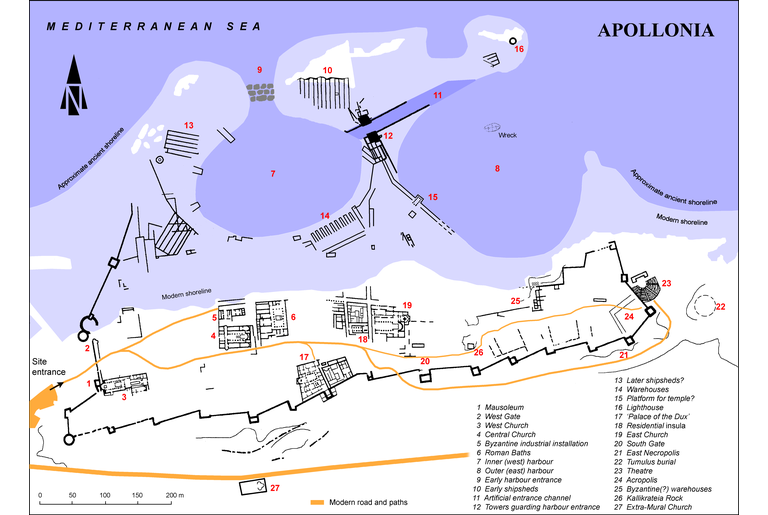Probably private honors and artist's signature
IGCyr064200
Trismegistos ID: 6187
Source Description
Support
Right block of a composite white marble base, badly damaged at upper edge and upper right corner of the inscribed face and cut off at left side, unless another block was formerly adjacent (1.06; 0.225;0.655).
Layout
Inscribed on front face in two lines of different height.
Letters
0.025 at l. 1, 0.02 at l. 2; careful cutting, slight serifs.
Place of Origin
Date
Late third to early second century B.C. (lettering)
Findspot
Found in 1929 in the Port of Cyrene, later Apollonia pleiades; HGL : probably in the East Church , which is presumably the place where the agora once stood.
Last recorded Location
Seen by J.M. Reynolds before 1974 in Shahat : Cyrene Museum .
Present Location
Not found by IGCyr team.
Text constituted from
Transcription from previous editors.
Bibliography
Pugliese Carratelli-Oliverio, 1961 Pugliese Carratelli, G., (from G. Oliverio), 1961, Iscrizioni cirenaiche, Quaderni di Archeologia della Libya (QAL)4, 3-54 - see in bibliography , p. 43, n. 21, ph. 42 fig. 36 and pp. 4, 52, and Robert, Bulletin Épigraphique Robert, J. and L., Bulletin Épigraphique in Revue des Études Grecques (REG)1938-1984 - see in bibliography , 1962.368, whence SEG Supplementum Epigraphicum Graecum, Leiden, then Amsterdam, 1923-1971, then 1979- - see in bibliography , 20.708; Reynolds, 1976 Reynolds, J.M., 1976, The Inscriptions of Apollonia, in R.G. Goodchild, J. Griffiths Pedley, D. White, J.H. Humphrey (eds.), Apollonia, the port of Cyrene: excavations by the University of Michigan, 1965-1967, Libya Antiqua (LibAnt)Suppl. 4, Tripoli, 293-333 - see in bibliography , n. 14, whence SEG Supplementum Epigraphicum Graecum, Leiden, then Amsterdam, 1923-1971, then 1979- - see in bibliography , 27.1125bis. Cf. Rosamilia, 2014 Rosamilia, E., 2014, Firme di scultori della Cirenaica: un'analisi del corpus, in Luni, M. (ed.), Cirene greca e romana, Monografie di archeologia libica36, Cirene Atene d'Africa7, Roma, 89-106 - see in bibliography , n. 11.
Apparatus
1 Pugliese Carratelli-Oliverio, 1961 Pugliese Carratelli, G., (from G. Oliverio), 1961, Iscrizioni cirenaiche, Quaderni di Archeologia della Libya (QAL)4, 3-54 - see in bibliography [---] ρητος : Reynolds, 1976 Reynolds, J.M., 1976, The Inscriptions of Apollonia, in R.G. Goodchild, J. Griffiths Pedley, D. White, J.H. Humphrey (eds.), Apollonia, the port of Cyrene: excavations by the University of Michigan, 1965-1967, Libya Antiqua (LibAnt)Suppl. 4, Tripoli, 293-333 - see in bibliography [Κ]ρητὸς : Rosamilia, 2014 Rosamilia, E., 2014, Firme di scultori della Cirenaica: un'analisi del corpus, in Luni, M. (ed.), Cirene greca e romana, Monografie di archeologia libica36, Cirene Atene d'Africa7, Roma, 89-106 - see in bibliography [Xά?]ρητος
1 Reynolds, 1976 Reynolds, J.M., 1976, The Inscriptions of Apollonia, in R.G. Goodchild, J. Griffiths Pedley, D. White, J.H. Humphrey (eds.), Apollonia, the port of Cyrene: excavations by the University of Michigan, 1965-1967, Libya Antiqua (LibAnt)Suppl. 4, Tripoli, 293-333 - see in bibliography , Rosamilia, 2014 Rosamilia, E., 2014, Firme di scultori della Cirenaica: un'analisi del corpus, in Luni, M. (ed.), Cirene greca e romana, Monografie di archeologia libica36, Cirene Atene d'Africa7, Roma, 89-106 - see in bibliography Ἀπόλλων[ος] : Pugliese Carratelli-Oliverio, 1961 Pugliese Carratelli, G., (from G. Oliverio), 1961, Iscrizioni cirenaiche, Quaderni di Archeologia della Libya (QAL)4, 3-54 - see in bibliography Ἀπόλλων[ι]
French translation
[---] (fils de)[---] rès, étant prêtre d'Apollon (a consacré ce monument).
Oeuvre de [d'Untel], fils d'Aristoménès, athénien.
English translation
[---] (son of) [---] res, while being priest of Apollo (dedicated this monument).
Made by [So-and-so], son of Aristomenes, an Athenian.
Italian translation
[---] (figlio di) [---] res, quando era sacerdote di Apollo (dedicò questo monumento).
Opera del [tale], figlio di Aristomenes, ateniese.
Commentary
Pugliese Carratelli edited this inscription from a photograph in the Cyrene archive with the help of a mention of the artist's signature made by Oliverio in a conference in 1938.
There are several possibilites for the father's name of the dedicant, which we prefer not to restore.
We follow Reynolds in relating the god's name to the office of priest with the genitive Ἀπόλλωνος, although this word-order is unusual. However, Pugliese Carratelli's idea of a dative is not impossible, the god's name being related to the understated verb of dedication and the priest being Apollo's one par excellence. The translation would then be 'being priest (dedicated this monument) to Apollo'. If the former is preferred, we would have private honors with only the identification of the person featured in the lost statue, without mention of the person responsible for the monument (for this type see for instance IGCyr022900).
The ending of the father's name of the dedicant belongs to a very short series of names attested in Cyrenaica. Two names with a genitive ending -ρητος (a type that is not very usual) are attested in Cyrenaica: Κρής which is one Reynold's suggestion, and Χάρης, which is Rosamilia's suggestion. As we do not know how long the preceding lost name was, we cannot decide which father's name we should choose.
Creative Commons Attributions-NonCommercial 4.0 International License.
All citation, reuse or distribution of this work must contain a link back to DOI: http://doi.org/10.6092/UNIBO/IGCYRGVCYR and the filename (IGCyr000000 or GVCyr000), as well as the year of consultation.
